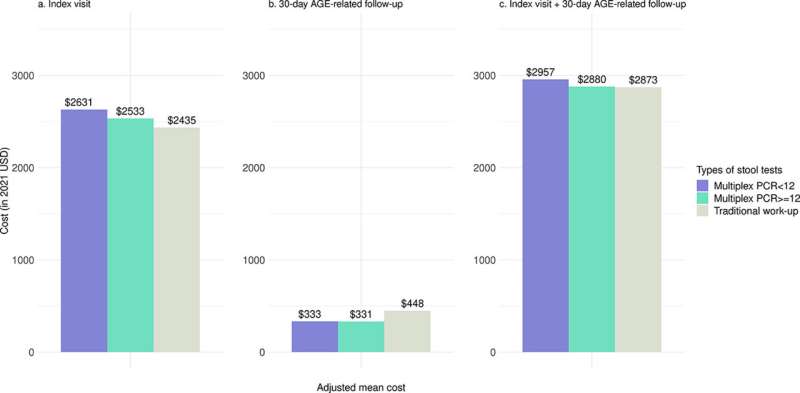
Acute gastroenteritis afflicts adults of all ages, causing significant suffering and inflicting significant costs on the American healthcare system. A new study encompassing nearly 40,000 hospital visits from a geographically diverse healthcare database shows that sampling a single stool, using multiple polymerase chain reaction (PCR) panels, can identify more pathogens, notably diarrhea-causing E. coli and enteric viruses, and do so more rapidly than a conventional workup.
The research is published in Journal of Clinical Microbiology.
Using multiple PCR panels, “Fewer patients received antibiotics, required additional visits or diagnostic tests, or were hospitalized for gastroenteritis within 30 days [of index visit],” said Rena C. Moon, M.D., M.P.H., Principal Research Scientist, PINC AI Applied Sciences, Charlotte, NC. Additionally, healthcare costs were lower than with a conventional workup.
Conventional workups may include testing a stool culture for a single suspect species of pathogen, use of a single pathogen PCR test, or identifying a pathogen using microscopy, immunology or an ova and parasites test.
“Earlier studies showed that large multiplex PCR panels improve the speed and accuracy of diagnostic testing in patients with acute gastroenteritis, but their impact on costs and clinical outcomes had been uncertain,” said Ferric C. Fang, M.D., Professor of Laboratory Medicine, Pathology, and Microbiology at the University of Washington School of Medicine, Seattle. “Our study shows that the benefits of multiplex panels can be achieved without increasing overall healthcare costs, and also facilitates more appropriate use of antibiotics.”
“This study illustrates the power of big data to analyze the healthcare impacts of diagnostic testing, and help laboratories select testing approaches that improve meaningful clinical outcomes,” Fang said.
Using multiplex PCR, more patients could be discharged and did not require hospitalization during the following month. That resulted in similar healthcare costs to patients undergoing the traditional stool work-up plus follow-up visits over the following month. Furthermore, multiplex PCR (using 12 or more) panels were associated with reduced administration of antibiotics to hospitalized patients.
The overall result: improved care with lower costs.
American Society for Microbiology

